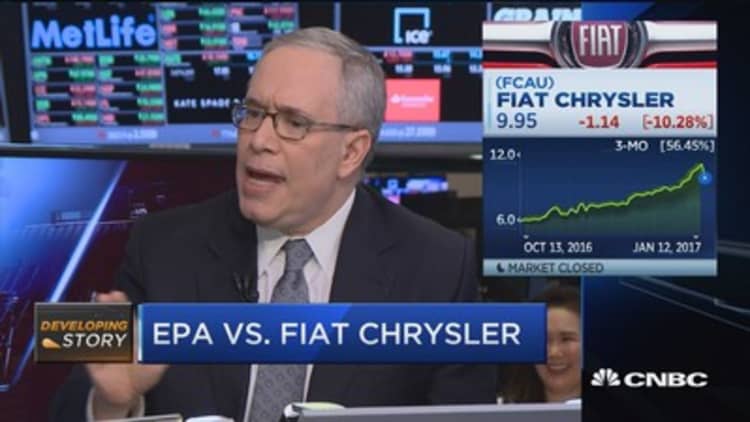The auto industry faces an uncertain future as President Donald Trump rips up the Trans Pacific Partnership, pledges to renegotiate NAFTA and change the focus of the Environmental Protection Agency. But one automaker seems poised to benefit more than its competitors: Fiat Chrysler (FCA).
The company has been saddled by poor sales of small and midsize cars, overreliance on trucks, poor performance outside of the United States and a lack of alternative energy offerings. Trump's policies, however, are making up for key weaknesses in the Italian/American conglomerate's portfolio. These weaknesses may become strengths as Trump's policy unfolds.
Though the Fiat brand is known for efficient microcars, FCA draws almost all of its profit from trucks and SUVs sold under the Ram and Jeep brands. Across all seven U.S. market brands under their umbrella, Fiat Chrysler offers only one plug-in hybrid and one electric vehicle. FCA does sell a lot of small cars globally, but in the current climate, truck and SUV margins industry-wide dwarf small-car margins.
"Amongst all major global auto manufacturers, FCA is the closest thing to a pure play on the U.S. light truck/SUV market," Morgan Stanley analyst Adam Jonas wrote in a report. "They were also inarguably in the most vulnerable position with respect to fuel economy standards which may have a more relaxed cadence/target level under the new administration."
More from Global Investing Hot Spots:
A multibillion-dollar natural gas boom promises to reunify Cyprus
10 popular products in the US you didn't know were made in Mexico
After China, Saudi Arabia fires a warning shot at Trump
Ram is the biggest moneymaker in the United States, while Jeep is globally its most profitable brand. Fiat, Chrysler, Dodge and Alfa Romeo are all valued negatively by Morgan Stanley.
FCA derives around 75 percent of its profit from North America.
U.S. auto market sales did cool off in January (FCA led the decline and its shares went lower on Wednesday) but FCA stock is reflecting bullishness relative to the other major U.S. automakers, up more than 50 percent since the November election results. It's a run made even more notable by the fact that it faces a new EPA case over allegations of flawed diesel emissions technology.
Amongst all major global auto manufacturers, FCA is the closest thing to a pure play on the US light truck/SUV market.Adam Jonasanalyst for Morgan Stanley
Most American automakers were unified in their disapproval of the Trans Pacific Partnership.
"We've been very vocal both as an industry and as a company, and we've repeatedly said that the mother of all trade barriers is currency manipulation," Ford CEO Mark Fields recently said, standing outside the White House after a meeting with the Big Three chief executives and the president. "And the TPP failed to address that."
The partnership would have allowed for cheaper Japanese and Korean competition in the U.S. market, posing a risk to all American automakers. But the TPP also helps make up for one of Fiat Chrysler's deficiencies: Asia.
FCA has weak sales in Asia. Ford and GM, on the other hand, have strong footholds in the Asian market. The TPP would have made the Asian market more profitable, giving Fiat Chrysler's competitors a leg up.
Trump's trade wars
| Company stock | YTD (%) | 1-year (%) | Since election (%) |
|---|---|---|---|
| FCA | 19.5 | 55 | 54 |
| Ford | 2 | 3 | 8 |
| GM | 4 | 20 | 14 |
Of course, the 800-pound gorilla in the room for automakers is NAFTA, or the North American Free Trade Agreement. The trade deal, which Trump said he will destroy, allows tariff-free trade with Mexico and Canada. This allows carmakers to build vehicles in the two countries and export them to the United States, which opponents allege has driven manufacturing out of the U.S.
This is a cause of concern for all automakers. From Toyota to Ford, almost every auto manufacturer builds cars in Mexico for the U.S. market. While the 20 percent import tariff that made headlines last week is far from certain — the White House quickly said it was only one of many options — border tariffs would make exportation from Mexico a non-starter, forcing the car companies scrambling to shift their strategies.
Fiat Chrysler CEO Sergio Marchionne, however, has positioned his company in a way that makes it more prepared than most. Fiat Chrysler is shuttering small-car production, which in the current climate is only profitable if done abroad. More importantly, he's moved or prepared plans to move all of FCA's most profitable models to the United States.
One of the last profitable FCA models for the U.S. market built in Mexico is the Ram 2500 and 3500, but Marchionne claimed at the Detroit Auto Show that the company's new investment in Michigan was partially "to provide additional capacity in the event that we have to move the heavy-duty truck out of Mexico and into the U.S."
A border tax certainly will hurt FCA in other ways. Engines for most of their models come from south of the border and the supply chain is deeply entrenched in Mexico, but compared to crosstown rivals like General Motors, who build some of their most profitable vehicles in Mexico, Fiat Chrysler may stand to gain market share.

Environmental standards are a point of contention among American automakers, as Tesla and GM benefit from tax credits for electric vehicles while other automakers worry that the EPA's fuel economy targets are getting too ambitious.
A less regulation-intense EPA would bode well for Fiat Chrysler's current lineup.
President Trump has already frozen all EPA grants and contracts, awaiting the confirmation of Scott Pruitt, his pick to head the agency. Not only did the former Oklahoma attorney general sue the EPA multiple times, but Trump himself called the agency a "disgrace."
"On the global warming issue, scientists at the EPA have been copying their files onto thumb drives for fear of a draconian style of leadership in the EPA," Richard Levick, head of crisis management company LEVICK, told CNBC.
A less litigious EPA with a weaker enforcement arm under Trump could also alleviate FCA's most immediate environmental problem. Earlier this month, the EPA accused the carmaker of cheating diesel emissions.
"It was no accident that within the last full week of the [Obama] administration is when the EPA announced this. And because Fiat Chrysler just announced more jobs in America, it's a favorable time for them to deal with Trump's administration," Levick said.
Experts told CNBC that the case against FCA is not as strong as the case against Volkswagen, which has paid out near-$20 billion so far related to the scandal. Executives are still facing criminal charges.
Tyson Slocum, director of the Public Citizen's Energy Program (an advocacy group founded by Ralph Nader), said the Fiat software does not appear to be designed to fool lab testers, as in the VW case. Diesel engines have difficulty in extreme cold temperatures, and the FCA software appears to disable it under certain circumstances. That is something that a carmaker has to inform the EPA about, and the EPA appears to be alleging that FCA failed to notify them. But Slocum said that's not the same as cheating.
"The prosecutors who come in under Trump may be more conservative and more likely to push these into civil, not criminal, cases," said Peter C. Anderson, principal at environment law firm Beveridge & Diamond.






